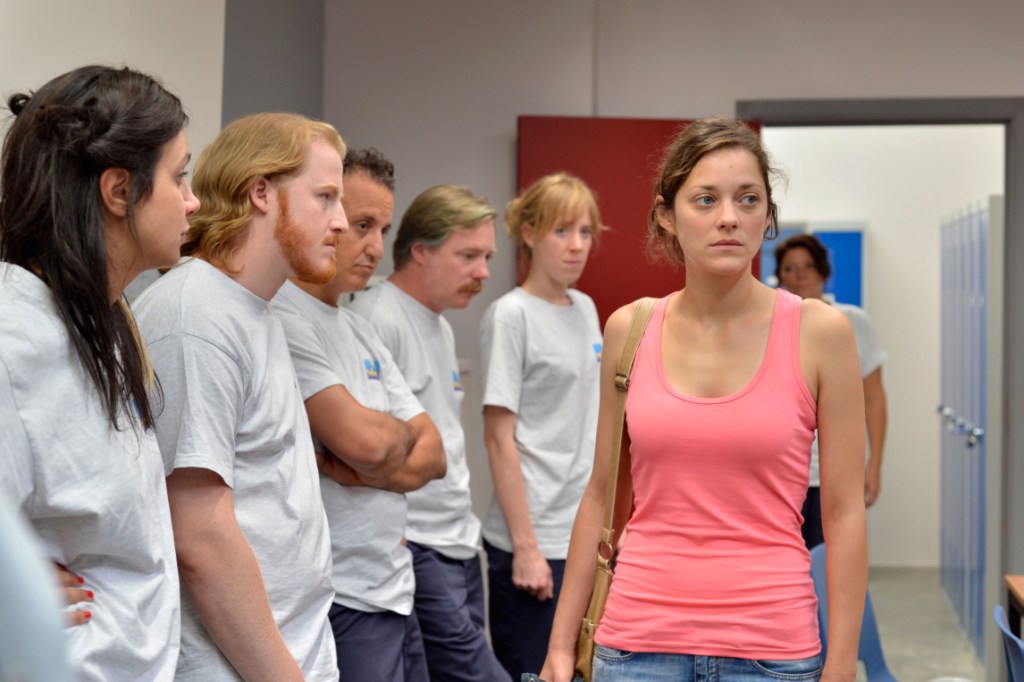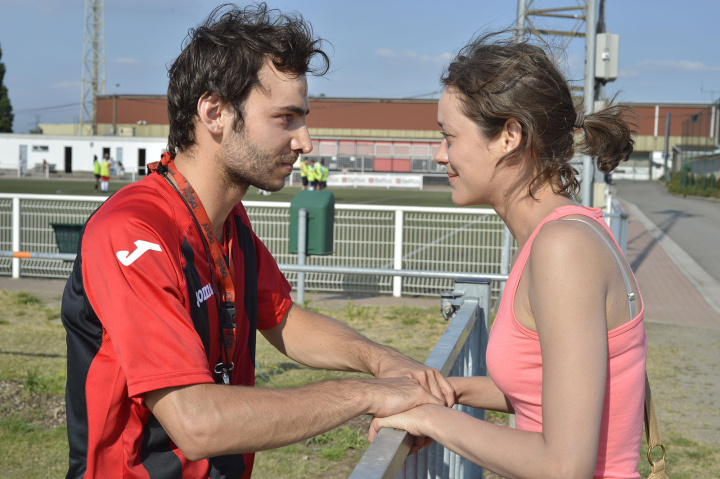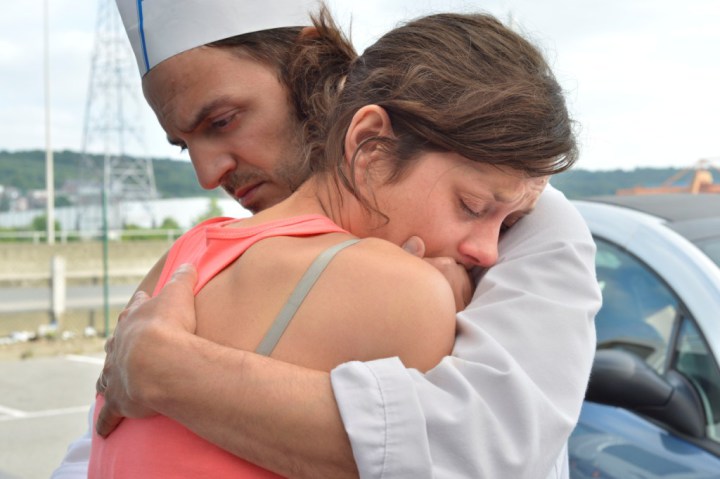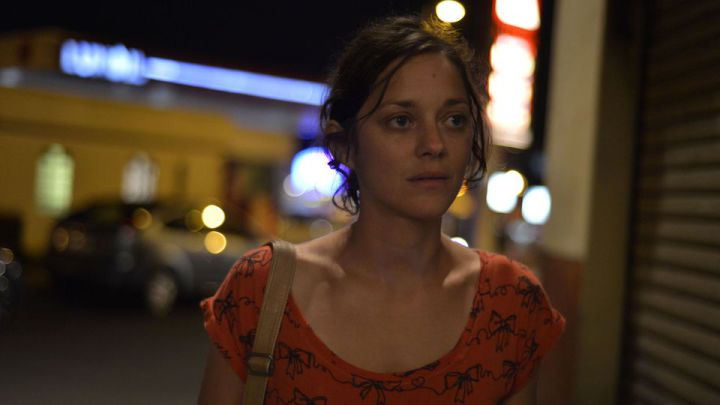Yes, Marion Cotillard is very good in Two Days, One Night, but when is she not good? The question in my mind: “Is it one of her best?” Is it even her best this year? Frankly, I think she was better in James Gray’s The Immigrant, which I also think is a better movie. (But The Immigrant just wasn’t the movie the Weinsteins chose to mount an Oscar campaign for this year — opting instead for The Imitation Game.) My biggest reservation with Two Days, One Night lies with its makers — Jean-Pierre and Luc Dardenne. I know they are the darlings of the critical set, but their hand-held minimalism is a little too hand-held and minimalist for me. I didn’t like The Son (2002) at all, but I did like Lorna’s Silence (2008) and came darn close to loving The Kid with a Bike (2011). My feelings about Two Days, One Night are closer to those on Lorna’s Silence. That’s to say the boys from Belgium have made a good film here, but not, I think, quite a great one. That it’s built around a very good performance certainly helps.
The film is essentially an indictment of how capitalism turns workers on each other to their company’s own ends. This is detailed through a very small-scale story concerning a Belgian solar panel plant that only has 17 workers. While one of them, Sandra (Marion Cotillard), was out on medical leave — being treated for depression — the company discovered that they did just fine with only 16 workers. In order to divest themselves of Sandra — who they suspect isn’t “strong” enough to come back to work anyway — they engineer a vote in which the other 16 vote for keeping her or losing their €1000 bonus (about $1200). Unsurprisingly, they mostly vote in their own favor, but Sandra’s boss offers a second vote — by secret ballot. The catch is that she only has the two days and one night of the title in which to tempt them to change their votes.
This is a shrewd device on which to hang the movie since it provides us with a built-in sense of urgency. Sandra has to visit 14 people (two had already voted for her to stay) and convince them — and often their spouses — to change their votes over the course of this one weekend. It would be a daunting task for anyone, but it’s worse for Sandra, whose depression — despite copious amounts of Xanax — threatens to overtake and paralyze her at every turn. She doubts her ability. She doubts her worthiness. She finds it hard to imagine that anyone would give up the bonus just so she can keep her job. Yet she also knows that she, her husband Manu (Fabrizio Rongione) and their family can’t make do without her salary from the factory. It’s even debatable if she can get by without the structure and sense of self-worth the job provides. So she keeps on trying — even while wanting to stop and sometimes actually doing it briefly — against the odds.
What makes the story work so well lies in the fact that — apart from the bosses — the film has no real villains. All of the characters have their reasons for needing that bonus, though some of them have considerably less admirable reasons than others. The film cleverly keeps you guessing what the next encounter will bring because the reactions are so varied. Some of it works better than other parts of it. There’s a sharply melodramatic turn late in the film that asks us to buy into a very improbable recovery. But on balance, it’s solid enough — and the so-very-right ending covers just about any shortcomings. I still don’t care much for the Dardennes’ minimalist aesthetic, but I can’t deny that the results here are frequently powerful. Rated PG-13 for some mature thematic elements.








I found it a little hard to believe that people could be so cold hearted, especially when she’s asking them face to face, what is this company she works for Fannie Mae?
I only found one or two of them cold-hearted. Most of them had very valid reasons why they needed the money. Cold-hearted would have been to tell her they’d vote for her or fob her off with promises of thinking about it and then voting her out.
They’re just real Topeka people.
Yeah I guess so, the one that really got me was the “we want to build a patio” one.
Yet she’s a turnaround.
An ill-developed one, I found. Her reversal comes out of nowhere for me.
You worry about that sort of thing more than you should.
Consistency? Yes, I suppose I do.
That isn’t quite what I’d call it. Even if it is, why do you expect consistency in characters when you so often don’t see it in actual people?
I like to know a little more about a character before s/he pulls that kind of big change. In this case, without knowing much about the situation or the person, I think the shift gums up the works.
Well, it’s not her story either. Still, you do get the information that this patio business seems to have mostly been her husband’s idea and her subsequent argument with him (in Cotillard’s favor) gave her the impetus to do something she’d been wanting to. That we don’t see that argument is not surprising, because we see nothing without Cotillard.
I agree with all of that, but I did not get the sense from her first chat with Cotillard that her marriage was that rocky and therefore had trouble believing the supremely conveniently-timed change.
But…why would you?
If she’s willing to leave him within 24 hours, I would think there’d be some sign of trouble in paradise…even just a little.
But we aren’t privvy to their paradise. Nor should we be.
No, but we are privy to their sudden fallout that shows up without warning and alters the course of the story. It doesn’t work for me at all and I found it a huge distraction.
I feel confident that in better movies I have given similarly underdeveloped actions the benefit of the doubt without thinking much about it, if at all. The issues here for me are that Cotillard’s repetitive plea grows stale and that the Dardennes don’t provide much in the way of cinematic distractions. With those conditions at work, the colleague leaving her husband negatively sticks out to me.
There are many things I don’t like about the film, but this is high on the list of Not One of Them. If I accept — and the film leaves no real option — that I’m not going to know or see anything that Cotillard doesn’t, then this is a non-issue.
We do see her husband bitching her out, so I was led to believe that its not a very happy marriage.
The issues here for me are that Cotillard’s repetitive plea grows stale and that the Dardennes don’t provide much in the way of cinematic distractions.
Well there is the sucker-punch KO. But yeah, I felt this way a points throughout the film. The 14 coworker checklist that Sandra must move through works both for and against the film. Certainly in provides instances of suspense and heightened emotional anticipation. At other times it feel like a rigid and convenient device that telegraphs too much of the action– and while I’d argue it never does quite, there’s a danger that this actually invites a more passive viewing experience. It sort of narrows the sense of imagination for both audiences and the filmmakers.
Oddly– or maybe to do with the reasons above– I count the reversal of the “patio woman” among the film’s stronger elements. I get the argument that the action is unsupported or unconvincing, but I simply took it as a case of One Can Never Tell… And by the time it becomes apparent that there are perhaps more than minor problems with the relationship, the action of walking out of that relationship subtly, indirectly supports the themes of the movie. I imagine a thought process in which the woman directly and perhaps for the first time asks herself “What kind of man am I with? And is that someone I can live with if I’m to be the kind of woman I want to be?” Not to say the film breaks its characters into two oversimplified groups of people– those for Sandra and those for the bonus– but much of the empathy channeled toward Sandra and her plight, benefits from both the characters and the audience asking themselves those very basic type of questions.
Ken, did you ever see The Selfish Giant?
No.
I’ve only seen two Dardenne films, this one and The Kid With The Bike, but The Selfish Giant is in the same vein as a Dardenne film and I like it better than both of the two I’ve seen.
Check it out streaming on Netflix its really good.
http://www.netflix.com/WiMovie/70285676?strkid=1371943149_0_0&trkid=222336&movieid=70285676
Trailer
https://www.youtube.com/watch?v=aJLO3BJEkGY
If you don’t vote, go see this movie. You only have one more chance (per Ken’s 11 Feb column, Thurs. 12 Feb at 1 PM is the Carolina’s last showing).
OK, comments here should be about artistic (or at least film industry) issues. But at its heart, this is a political film: it is, at least to me, a realisic depiction of today’s EU austerity economy (could just as well be the US with slightly different scenery and no subtitles) and the merciless consequences of a mindless devotion to the “free market,” even for our labor as human beings. I saw it at an Italian municipal outdoor summer cinema about 6 months ago, and from audience reactions leaving the venue, I don’t think many failed to identify with the situation.
No one in a civilized society should be put in the position of the folks depicted in this film; not the lead character, and not her (former) coworkers. And while there’s an almost-Hollywood sorta-feelgood ending, a lot of folks in the offscreen world won’t have that luxury.
Go see it. Imagine yourself in a similar position (yeah, I realize that folks to the right of the spectrum are empathy-challenged, but I think this film may be compelling enough to overcome that handicap). Then, next chance you have to vote, remember it.
Well said, but let me make one correction. The single 1 p.m. showtime starts on Fri., Feb. 13 and should continue through Thu., Feb. 19.
I wondered aboutut the fact that Sandra offered up the names of the people who had said they would vote for her at first, and later refused because it was to be a secret vote. Was this a sign that she had become self-defeating at that point (not willing to give names) or more honest and fair, given the idea that it was secret battle? A small point, but I wondered about it…